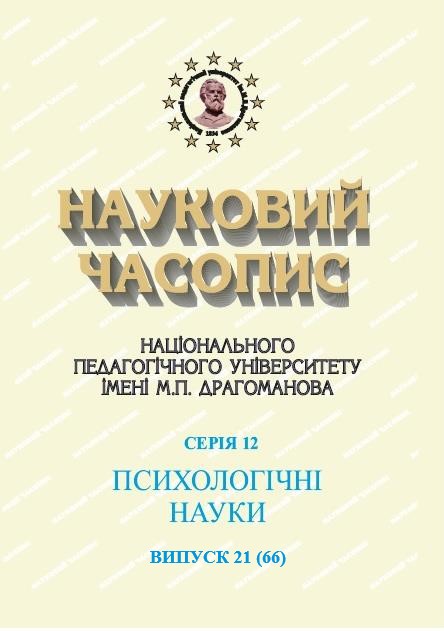GENDER DIFFERENTIATION OF STRESS SIGNS IN WAR CONDITIONS
DOI:
https://doi.org/10.31392/NPU-nc.series12.2023.21(66).02Keywords:
full-scale russian invasion of Ukraine, danger, stress, general level of stress, gender differences in stress signs.Abstract
The article examines the main scientific approaches to the study of stress factors affecting the personality, in particular during the full-scale russian-Ukrainian war. The purpose of the study is to identify the general level of stress of the individual in the conditions of the full-scale invasion of russia in Ukraine and to find its gender differences. The specificity of the general stress of the individual is considered and analyzed according to its corresponding gradations: absent (weak) stress, moderate, pronounced stress, a state of severe stress, depletion of adaptive energy reserves. The results of an empirical study of the peculiarities of the development of general stress among modern Ukrainians in the conditions of military rule in the country, as well as its intellectual, behavioral, emotional and physiological signs, are presented. It is shown that the vast majority of Ukrainians are in a state of moderate and severe tension during the full-scale war with russia in Ukraine. A small number of people have no/mild stress or severe stress. The gender differentiation of general stress and its intellectual, behavioral, emotional and physiological signs in the conditions of a full-scale russian invasion of Ukraine is analyzed and described. It has been proven that the intensity of general stress in men and women has no significant differences and is in the zone of pronounced tension. In women, the frequency and range of stress manifestations in all its signs is higher, compared to men. A statistically significant difference in the physiological manifestations of stress between men and women was revealed: the intensity and number of phenomenological markers of stress in women is higher, compared to men. The existence of gender differences in the hierarchy of phenomenological markers of intellectual, behavioral, emotional and physiological signs of stress was established. In particular, it was established that in the behavioral and emotional manifestations of stress, the feminine nature of the reaction is preserved in most women, and the masculine nature of the reaction in men. At the physiological level, labile situational stress reactions prevail in men (increased sweating, accelerated non-rhythmic pulse), and in women - rigid, delayed ones (increased fatigue, pains in various parts of the body of an undefined nature, headaches).
References
- Zhuravlova, L., & Bondarenko-Berehovych, V. (2022). Vikovi osoblyvosti empatiinosti uchasnykiv antyterorystychnoi operatsii ta uchasnykiv boiovykh dii [Age-specific features of empathy among participants in anti-terrorist operations and participants in hostilities]. Zbirnyk prats uchasnykiv Mizhnarodnoi naukovo-praktychnoi konferentsii. 100-richchia Poliskoho natsionalnoho universytetu: zdobutky, realii, perspektyvy – Collection of works of the participants of the International Scientific and Practical Conference. The 100th anniversary of the Polish National University: achievements, realities, prospects (Zhytomyr, 1 November, 2022). 355–361 [in Ukrainian].
- Zhuravlova, L., & Krotiuk, K. (2020). Osoblyvosti tsinnisno-smyslovoi sfery viiskovosluzhbovtsiv z riznym dosvidom uchasti v boiovykh diiakh [Peculiarities of the value-meaning sphere of servicemen with different experience of participating in combat operations]. Naukovyi chasopys NPU imeni M.P. Drahomanova. Seriia: Psykholohichni nauky – Scientific journal of the Drahomanov University. Series: Psychological Sciences, 10(55), 26–36. Retrieved from https://sj.npu.edu.ua/index.php/pn/article/view/909 [in Ukrainian].
- Nauholnyk, L.B. (2015). Psykholohiia stresu [Psychology of stress]. Lviv : Lvivskyi derzhavnyi universytet vnutrishnikh sprav [in Ukrainian].
- Rozov, V.I. (2005). Adaptyvni antystresovi psykhotekhnolohii [Adaptive anti-stress psychotechnologies]. Kyiv : Condor [in Ukrainian].
- Shcherbatykh Yu.V. (2006). Psikhologiya stressa i metody korrektsii [Psychology of stress and methods of correction]. Saint Petersburg : Piter [in Russian].
- Bonaz, B. (2016). Stress and the Gastrointestinal System. In Neuro-Immuno-Gastroenterology Springer International Publishing, 123–156.
- Jones, F., Bright, J. and Clow, A. (2001). Stress: Myth, Theory, and Research. Harlow : Pearson Education.
- Selye, H. (2013). Stress in Health and Disease: Elsevier Science. Режим доступу: https://www.dymocks.com.au/book/stress-in-health-and-disease-by-hans-selye-9781483192215
- Tache, Y. (2014). Hans Selye and the stress response: from "the first mediator" to the identification of the hypothalamic corticotropin-releasing factor. Ideggyogyaszati Szemle, 67(3-4), 94–97. Retrieved from https://www.researchgate.net/publication/279632197_
Hans_selye_and_the_stress_response_From_The_first_mediator_to_the_
identification_of_the_hypothalamic_corticotropin-releasing_factor - Zhuravlova, L., & Chebykin, O. (2021). The Development of Empathy: Phenomenology, Structure and Human Nature. New York : Abingdon, Oxon. Retrieved from https://doi.org/10.4324/9781003145370

